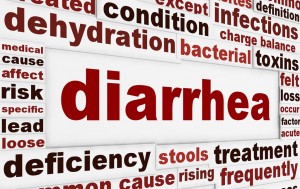 Diarrhea is an increase in the looseness (usually runny or watery) and frequency of bowel movements per day. Diarrhea that lasts less than one week is considered to be acute diarrhea, while diarrhea lasting longer than four weeks is called chronic diarrhea. Most acute cases of diarrhea are caused by gastrointestinal (GI) infections and clear up within a few days. Children under age 3 have an average of 1-3 episodes of acute diarrhea per year. If your child is experiencing diarrhea that lasts longer than 1-2 weeks, he may need diagnostic testing to check for any underlying medical conditions.
Diarrhea is an increase in the looseness (usually runny or watery) and frequency of bowel movements per day. Diarrhea that lasts less than one week is considered to be acute diarrhea, while diarrhea lasting longer than four weeks is called chronic diarrhea. Most acute cases of diarrhea are caused by gastrointestinal (GI) infections and clear up within a few days. Children under age 3 have an average of 1-3 episodes of acute diarrhea per year. If your child is experiencing diarrhea that lasts longer than 1-2 weeks, he may need diagnostic testing to check for any underlying medical conditions.
Acute diarrhea, lasting less than one week, can be caused by infections, food poisoning, allergic reaction to food, and medications such as antibiotics. Acute diarrhea usually stops once the child’s body clears the infection or toxin. Most children with acute diarrhea do not need treatment with medication. If the diarrhea is lasting longer than one or two weeks, then further testing may be needed.
Chronic diarrhea, persisting for more than 4 weeks, can be caused by Inflammatory Bowel Disease, Celiac Disease, Irritable Bowel Syndrome, food allergies, lactose intolerance, and leakage of stool around hard stool stuck in the rectum. The treatment of your child’s diarrhea depends on the cause.
Diarrhea can have many different causes, with the most predominant being viruses and bacteria. Because these are highly contagious, children often become infected through person-to-person contact, such as at day care facilities, or by touching contaminated surfaces and then putting their fingers in their mouths. Diarrhea is the body’s way of eliminating these germs from the digestive tract. Common GI infections that cause diarrhea include:
 If a virus, bacterial infection, or parasite brings on diarrhea, your child may experience other symptoms including:
If a virus, bacterial infection, or parasite brings on diarrhea, your child may experience other symptoms including:
Diarrhea caused by infection typically lasts a few days and is not a serious condition as long as the child stays hydrated. Other causes of diarrhea can be:
Treatment for diarrhea in children can usually be done at home with rest and plenty of fluids. One of the biggest concerns when a child has diarrhea is dehydration. A child with a mild case of diarrhea can typically eat and drink normally. A child with moderate to severe diarrhea loses a significant amount of fluids quickly, therefore needs to take in extra fluids to replenish the loss. If a child is younger than 1 year old and is experiencing diarrhea, you should take dehydration prevention measures immediately

Children who are under 6 months of age or who have other health concerns should be monitored carefully, as they can dehydrate rapidly. If your child is showing signs of dehydration, call your doctor immediately.
While all cases of diarrhea can’t be avoided, there are some easy preventative measures that you can take to lessen your child’s risk of getting diarrhea:
If your child has diarrhea and is under 6 months of age, you should consult your doctor right away. Always monitor your child for symptoms of dehydration and call your doctor if your child:
If you would like more information about gastrointestinal (GI) digestive disorders and nutrition in children, please contact Dr. Mona Dave’s Frisco Office.